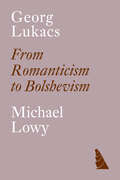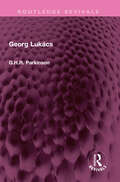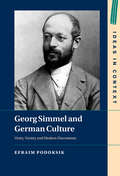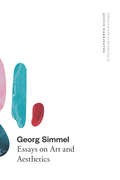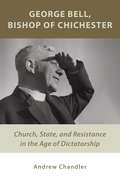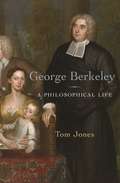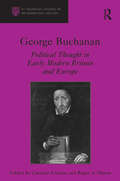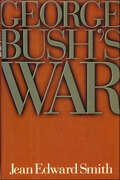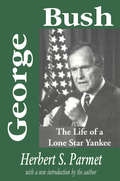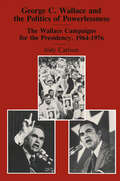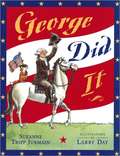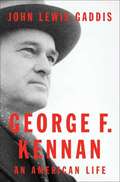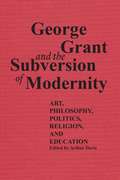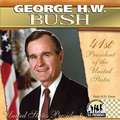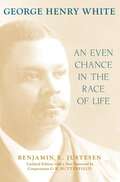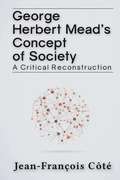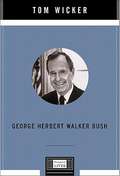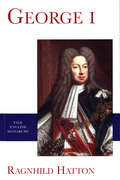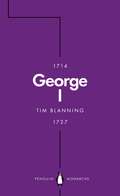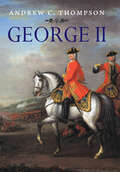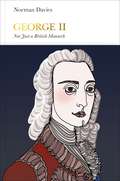- Table View
- List View
Georg Lukacs: From Romanticism to Bolshevism
by Michael LöwyOn the 100th anniversary of the publication of History and Class Consciousness, a new edition of this indispensable guide to Lukacs's thought and politicsThe philosophical and political development that converted Georg Lukács from a distinguished representative of Central European aesthetic vitalism into a major Marxist theorist and Communist militant has long remained an enigma.In this this now classic study, Michael Löwy for the first time traced and explained the extraordinary mutation that occurred in Lukács's thought between 1909 and 1929. Utilizing many as yet unpublished sources, Löwy meticulously reconstructed the complex itinerary of Lukács's thinking as he gradually moved towards his decisive encounter with Bolshevism.The religious convictions of the early Lukács, the peculiar spell exercised on him and on Max Weber by Dostoyevskyan images of pre-revolutionary Russia, the nature of his friendships with Ernst Bloch and Thomas Mann, were amongst the discoveries of the book.Then, in a fascinating case-study in the sociology of ideas, Löwy showed how the same philosophical problematic of Lebensphilosophie dominated the intelligentsias of both Germany and Hungary in the pre-war period, yet how the different configurations of social forces in each country bent its political destiny into opposite directions. The famous works produced by Lukács during and after the Hungarian Commune—Tactics and Ethics, History and Class Consciousness and Lenin—were analysed and assessed. A concluding chapter discussed Lukács's eventual ambiguous settlement with Stalinism in the thirties, and its coda of renewed radicalism in the final years of his life.In this new edition, Löwy has added a substantial new introduction which reassess the nature of Lukacs's thought in the light of newly published texts and debates.
Georg Lukács (Routledge Revivals)
by G.H.R. ParkinsonFirst published in 1977, Georg Lukács gives an outline of Lukács’ views and explains how they are related to the relevant cultural traditions of his epoch. The author covers the whole range of Lukács’ thought, from his earliest literary criticism to the posthumous Ontology of Social Existence. Lukács’ early writings in particular are frequently obscure in style and impregnated with the language and thought of Hegel. Professor Parkinson has elucidated Lukács’ principal writings in systematic fashion, and the book includes a detailed exposition of Lukács’ influential but difficult book History and Class Consciousness. This should be an indispensable book for all those who seek a clear, comprehensible introduction to the writings of one of the most influential Marxist thinkers of our time.
Georg Simmel and German Culture: Unity, Variety and Modern Discontents (Ideas in Context #135)
by Efraim PodoksikThe significance of the German philosopher and social thinker, Georg Simmel (1858–1918), is only now being recognised by intellectual historians. Through penetrating readings of Simmel's thought, taken as a series of reflections on the essence of modernity and modern civilisation, Efraim Podoksik places his ideas within the context of intellectual life in Germany, and especially Berlin, under the Kaiserreich. Modernity, characterised by the growing differentiation and fragmentation of culture and society, was a fundamental issue during Simmel's life, underpinning central intellectual debates in Imperial Germany. Simmel's thought is depicted here as an attempt at transforming the complexity of these debates into a coherent worldview that can serve as an effective guide to understanding their main parameters. Paying particular attention to the genealogy and usage of the concepts of Bildung, culture and civilisation in Germany, this study offers contextual analyses of Simmel's philosophies of culture, society, art, religion and the feminine, as well as his interpretations of Dante, Kant, Nietzsche, Schopenhauer, Goethe and Rembrandt.
Georg Simmel: Essays on Art and Aesthetics (Heritage Of Sociology Ser.)
by Georg SimmelGeorg Simmel is one of the most original German thinkers of the twentieth century and is considered a founding architect of the modern discipline of sociology. Ranging over fundamental questions of the relationship of self and society, his influential writings on money, modernity, and the metropolis continue to provoke debate today. Fascinated by the relationship between culture, society, and economic life, Simmel took an interest in myriad phenomena of aesthetics and the arts. A friend of writers and artists such as Auguste Rodin, Rainer Maria Rilke, and Stefan George, he wrote dozens of pieces engaging with topics such as the work of Michelangelo, Rembrandt, and Rodin, Japanese art, naturalism and symbolism, Goethe, “art for art’s sake”, art exhibitions, and the aesthetics of the picture frame. This is the first collection to bring together Simmel’s finest writing on art and aesthetics, and many of the items appear in English in this volume for the first time. The more than forty essays show the protean breadth of Simmel’s reflections, covering landscape painting, portraiture, sculpture, poetry, theater, form, style, and representation. An extensive introduction by Austin Harrington gives an overview of Simmel’s themes and elucidates the significance of his work for the many theorists who would be inspired by his ideas. Something of an outsider to the formal academic world of his day, Simmel wrote creatively with the flair of an essayist. This expansive collection of translations preserves the narrative ease of Simmel’s prose and will be a vital source for readers with an interest in Simmel’s trailblazing ideas in modern European philosophy, sociology, and cultural theory.
George Bell, Bishop of Chichester: Church, State, and Resistance in the Age of Dictatorship (The\selected Letters And Papers Of George Bell, Bishop Of Chichester Ser.)
by Andrew ChandlerThe story of a significant British church leader who fought for justice and freedom during World War IIIt was to George Bell, an English bishop, that Dietrich Bonhoeffer sent his last words before he was executed at the Flossenbürg concentration camp in April 1945. Why he did so becomes clear from Andrew Chandler's new biography of George Kennedy Allen Bell (1883–1958).As he traces the arc of Bell's life, Chandler reshapes our perspective on Bonhoeffer's life and times. In addition to serving as bishop of Chichester, Bell was an internationalist and ecumenical leader, one of the great Christian humanists of the twentieth century, a tenacious critic of the obliteration bombing of enemy cities during World War II, and a key ally of those who struggled for years to resist Hitler in Germany itself.This inspiring biography raises important questions that still haunt the moral imagination today: When should the word of protest be spoken? When should nations go to war, and how should they fight? What are our obligations to the victims of dictators and international conflict?
George Bell, Bishop of Chichester: Church, State, and Resistance in the Age of Dictatorship (The\selected Letters And Papers Of George Bell, Bishop Of Chichester Ser.)
by Andrew ChandlerThe story of a significant British church leader who fought for justice and freedom during World War IIIt was to George Bell, an English bishop, that Dietrich Bonhoeffer sent his last words before he was executed at the Flossenbürg concentration camp in April 1945. Why he did so becomes clear from Andrew Chandler's new biography of George Kennedy Allen Bell (1883–1958).As he traces the arc of Bell's life, Chandler reshapes our perspective on Bonhoeffer's life and times. In addition to serving as bishop of Chichester, Bell was an internationalist and ecumenical leader, one of the great Christian humanists of the twentieth century, a tenacious critic of the obliteration bombing of enemy cities during World War II, and a key ally of those who struggled for years to resist Hitler in Germany itself.This inspiring biography raises important questions that still haunt the moral imagination today: When should the word of protest be spoken? When should nations go to war, and how should they fight? What are our obligations to the victims of dictators and international conflict?
George Berkeley: A Philosophical Life
by Tom JonesA comprehensive intellectual biography of the Enlightenment philosopherIn George Berkeley: A Philosophical Life, Tom Jones provides a comprehensive account of the life and work of the preeminent Irish philosopher of the Enlightenment. From his early brilliance as a student and fellow at Trinity College Dublin to his later years as Bishop of Cloyne, Berkeley brought his searching and powerful intellect to bear on the full range of eighteenth-century thought and experience.Jones brings vividly to life the complexities and contradictions of Berkeley’s life and ideas. He advanced a radical immaterialism, holding that the only reality was minds, their thoughts, and their perceptions, without any physical substance underlying them. But he put forward this counterintuitive philosophy in support of the existence and ultimate sovereignty of God. Berkeley was an energetic social reformer, deeply interested in educational and economic improvement, including for the indigenous peoples of North America, yet he believed strongly in obedience to hierarchy and defended slavery. And although he spent much of his life in Ireland, he followed his time at Trinity with years of travel that took him to London, Italy, and New England, where he spent two years trying to establish a university for Bermuda, before returning to Ireland to take up an Anglican bishopric in a predominantly Catholic country.Jones draws on the full range of Berkeley’s writings, from philosophical treatises to personal letters and journals, to probe the deep connections between his life and work. The result is a richly detailed and rounded portrait of a major Enlightenment thinker and the world in which he lived.
George Buchanan: Political Thought in Early Modern Britain and Europe (St Andrews Studies In Reformation History Ser.)
by Caroline ErskineGeorge Buchanan (1506-82) was the most distinguished Scottish humanist of the sixteenth century with an unparalleled contemporary reputation as a Latin poet, playwright, historian and political theorist. However, while his contemporary importance as the scourge of Mary Queen of Scots and advocate of popular rebellion has long been recognised, this volume represents the first attempt to explore the subsequent influence of his ideas and his contested reputation as a political ideologue and cultural icon. Featuring a wide-ranging selection of essays by an international cast of established and younger scholars, the volume explores Buchanan's legacy as an historian and political theorist in Britain and Europe in the two centuries following his death, with particular emphasis on the reception of his remarkably radical views on popular sovereignty and political assassination. Divided into four parts, the volume covers the immediate impact and reception of his writings in sixteenth- and early seventeenth-century Britain; the wider Northern European context in which his thought was influential; the engagement with his political ideas in the course of the seventeenth-century British constitutional struggles; and the influence of his ideas as well as the changing nature of his reputation through the eighteenth century and beyond. The introduction to the volume not only reviews the material in the body of the collection, but also reflects on the use and abuse of Buchanan's ideas in the early modern period and the methodological issues of influence and reputation raised by the contributors. Such a reassessment of Buchanan and his legacy is long overdue and this volume will be welcomed by all scholars with an interest in the political and cultural history of early modern Britain and Europe.
George Bush's War
by Jean Edward SmithGeorge Bush's War by Jean Edward Smith chronicles the complete history of the 1991 Persian Gulf War. Smith takes the reader from the politics of Desert Shield to the military action of Desert Storm."Expressing constant misgivings about presidential warmaking, [Smith] provides a virtual day-by-day chronicle of the decisions of 1990 that led to war ... Highly recommended.” —Library Journal
George Bush: The Life of a Lone Star Yankee
by Herbert S. ParmetIn the first full biography of the former president, award-winning historian and biographer Herbert S. Parmet draws from George Bush's personal papers to look at the man who led America through the end of the Cold War. Enriched by access to Bush's private diaries, the book provides an intimate portrait of the forty-first president, and corrects many long-held misconceptions about him.Parmet shows George Bush within the context of a half century of American life and politics, at a time when great changes swept the nation. Parmet traces Bush's life from his New England youth, through World War II; from his leadership of the CIA, through his vice presidency and presidency, through his loss of the 1992 presidential election to Bill Clinton.This book will be of interest to readers of politics and political biographies.
George C. Marshall: Ordeal And Hope, 1939-1942
by Forrest PogueMarshall is seen here in all his public and private dealing with the other soldiers, statesmen, and politicians who shaped the course of the war.
George C. Wallace and the Politics of Powerlessness: The Wallace Campaigns for the Presidency, 1964-76
by Jody CarlsonThis is the only complete study of the Wallace phenomenon. It covers all of the presidential campaigns and views wallace from a variety of vantage ints: historical context, content anal-ysis of speeches, and analysis of elec-tion data, including voting statistics and attitudinal patterns of supporters. Poli-tics of Powerlessness examines na-tionwide support for George C. Wal-lace in the presidential campaigns of 1964, 1968, 1972, and 1976. A number of election and candidate preference surveys are used as sources of data on supporters. An understanding of Wal-lace's appeal is provided through an examination of themes noted through-out his speeches and an analysis of his political history from biographical sources, personal interviews, and newspaper accounts of the time. The picture of Wallace that emerges is one of a man who saw himself as a crusader for his supporters' interests, while de-liberately heightening and intensifying their feelings of powerlessness as a means of getting votes.Carlson shows that Wallace voters were not marginal. They did not reflect a loss of status, nor were they simply outside the mainstream of political life. They were very much like major party voters, with the exception of their feel-ings of political powerlessness that me about by increased government ..rticipation in state politics. This work informed not only by a careful anal-ysis, but by interviews with Wallace, many of his followers, and people active in his campaigns. The work has the additional advantage of having follow-up analyses and interviews as, late as 1978. In this sense, it represents not only a scholarly analysis of the Wallace phenomenon, but the most up-to-date analysis as well.
George Did It
by Suzanne Tripp JurmainEveryone wanted George Washington to be the president. He was responsible, led the army in a fight against the British, and helped write the Constitution. But being the president is a very important job, and George was too nervous. So, to everyone surprise, he said no! However, George had many supporters, and with the help of the cheering crowds and loyal advisers and dignitaries, George realized that he didn't have time to think about how nervous he was, he just had to do his job. With little-known facts and a bit of humor, Suzanne Tripp Jurmain gives readers a glimpse into the more personal side of the first president of the United States.
George F. Kennan: An American Life
by John Lewis GaddisSelected by The New York Times Book Review as a Notable Book of the Year. Drawing on extensive interviews with George Kennan and exclusive access to his archives, an eminent scholar of the Cold War delivers a revelatory biography of its troubled mastermind. In the late 1940s, George Kennan wrote two documents, the "Long Telegram" and the "X Article," which set forward the strategy of containment that would define U.S. policy toward the Soviet Union for the next four decades. This achievement alone would qualify him as the most influential American diplomat of the Cold War era. But he was also an architect of the Marshall Plan, a prizewinning historian, and would become one of the most outspoken critics of American diplomacy, politics, and culture during the last half of the twentieth century. Now the full scope of Kennan's long life and vast influence is revealed by one of today's most important Cold War scholars. Yale historian John Lewis Gaddis began this magisterial history almost thirty years ago, interviewing Kennan frequently and gaining complete access to his voluminous diaries and other personal papers. So frank and detailed were these materials that Kennan and Gaddis agreed that the book would not appear until after Kennan's death. It was well worth the wait: the journals give this book a breathtaking candor and intimacy that match its century-long sweep. We see Kennan's insecurity as a Midwesterner among elites at Princeton, his budding dissatisfaction with authority and the status quo, his struggles with depression, his gift for satire, and his sharp insights on the policies and people he encountered. Kennan turned these sharp analytical gifts upon himself, even to the point of regularly recording dreams. The result is a remarkably revealing view of how this greatest of Cold War strategists came to doubt his strategy and always doubted himself. This is a landmark work of history and biography that reveals the vast influence and rich inner landscape of a life that both mirrored and shaped the century it spanned.<P><P> Pulitzer Prize winner
George Grant and the Subversion of Modernity: Art, Philosophy, Religion, Politics and Education (The Royal Society of Canada Special Publications)
by Arthur DavisGeorge Grant's mystique as a public philosopher is due in part to the seemingly contradictory political stances he took through the years. His opposition to the Vietnam war and his linking of liberalism with technological progress and imperialism brought him favour among the political left during the 1960s. Then, in the following decade, his opposition to abortion earned him allies on the political right, despite his rejection of limitless capitalist growth and free trade with the US. This collection of original essays reveals the complex philosophic, artistic, and religious sources underlying Grant's public positions of nationalism, pacifism, and conservatism.The collection begins with Grant's previously unpublished writing on Céline. This is a bold and vigorous Grant, writing on a topic about which he is passionate and deeply informed. Grant's own work is followed by two pieces that explore his devotion to Céline, Nietzsche, Heidegger, Weil, and Strauss also receive special attention here. Many of the essays draw on manuscripts and notes left unpublished by Grant, thus contributing new perspectives to the ongoing discussion of his work.The focus of this book is the unknown George Grant, namely, the philosophic, religious, and artistic inspiration behind his well-known public positions. Here we discover the great modern thinkers who animated Grant, and whose writings occupied him for much of his life.
George H. W. Bush: Forty-first President Of The United States
by Rebecca StefoffExamines the childhood, education, employment, and political career of the forty-first president.
George H.W. Bush (The United States Presidents)
by Heidi M.D. ElstonIn addition, his family and personal life, as well as his retirement years a disaster-relief fundraiser is highlighted. Easy-to-read text details Bush's military service during World War II and his political career as a member of the U.S. House of Representatives, U.S. ambassador to the United Nations, chairman of the Republican National Committee, chief U.S. liaison to China, director of the CIA, and vice president.
George Henry White: An Even Chance in the Race of Life (Southern Biography Series)
by Benjamin R. Justesen G. K. ButterfieldAlthough he was one of the most important African American political leaders during the last decade of the nineteenth century, George Henry White has been one of the least remembered. A North Carolina representative from 1897 to 1901, White was the last man of his race to serve in the Congress during the post-Reconstruction period, and his departure left a void that would go unfilled for nearly thirty years. At once the most acclaimed and reviled symbol of the freed slaves whose cause he heralded, White remains today largely a footnote to history. In this exhaustively researched biography, Benjamin R. Justesen rescues from obscurity the fascinating story of this compelling figure's life and accomplishments.The mixed-race son of a free turpentine farmer, White became a teacher, lawyer, and prosecutor in rural North Carolina. From these modest beginnings he rose in 1896 to become the only black member of the House of Representatives and perhaps the most nationally visible African American politician of his time. White was outspoken in his challenge to racial injustice, but, as Justesen shows, he was no militant racial extremist as antagonistic white democrats charged. His plea was always for simple justice in a nation whose democratic principles he passionately loved. A conservative by philosophy, he was a dedicated Republican to the end. After he retired from Congress, he remained active in the fight against racial discrimination, working with national leaderas of both races, from Booker T. Washington to the founders of the NAACP. Through judicious use of public documents, White's speeches, newspapers, letters, and secondary sources, Justesen creates an authoritative and balanced portrait of this complex man and proves him to be a much more effective leader than previously believed.
George Herbert Mead's Concept of Society: A Critical Reconstruction
by Jean-François CôtéThis book offers a new look at Mead's concept of society, in an attempt to reconstruct its significance for sociological theory. Chapter 1 offers a critical genealogical reading of writings, from early articles to the latest books, where Mead articulates his views on social reform, social psychology, and the gradual theorization of self and society. Chapter 2 pays attention to the phylogenetic and ontogenetic processes at work in both the self and society, by comparing Mead's social psychology with Freudian and Lacanian psychoanalysis. Chapter 3 brings together all the elements that are part of the structures of self and society within a topological and dialectical schematization of their respective and mutual relations. Chapter 4 is devoted to the passage of Mead's views from social psychology to sociology, with a critical look at Herbert Blumer's developments in symbolic interactionism as the presumed main legitimate heir of Mead's social psychology. Chapter 5 examines how Mead's general philosophical views fit within the new epistemological context of contemporary society based on communication and debates on postmodernity.
George Herbert Walker Bush
by Tom WickerNo one is more qualified to give a fully rounded, objective portrait of our forty-first president than Tom Wicker. A political correspondent for The New York Times for more than thirty years, Wicker was a first-hand witness to and reporter of George H. W. Bush’s political rise and presidential reign. In George Herbert Walker Bush, Wicker provides a richly drawn and succinct overview of Bush from his New England roots, his decorated service in World War II, and his successful oil businesses to his shift to politics and rapid rise within the Republican party. As he describes changes within the Republican party in recent decades, Wicker charts Bush’s career, including in-depth analysis of his campaign tactics and his gift for creating friendships and inspiring loyalty which, Wicker argues, has been the key to Bush’s success. The result is a fascinating, timely glimpse into one of the most powerful families in America today, complete with insights into the current reign of George W. Bush, the continued legacy of the Bush family, and contemporary American politics. .
George Herbert Walker Bush
by Tom WickerNo one is more qualified to give a fully rounded, objective portrait of our forty-first president than Tom Wicker. A political correspondent for The New York Times for more than thirty years, Wicker was a first-hand witness to and reporter of George H. W. Bush's political rise and presidential reign. In George Herbert Walker Bush, Wicker provides a richly drawn and succinct overview of Bush from his New England roots, his decorated service in World War II, and his successful oil businesses to his shift to politics and rapid rise within the Republican party. As he describes changes within the Republican party in recent decades, Wicker charts Bush's career, including in-depth analysis of his campaign tactics and his gift for creating friendships and inspiring loyalty which, Wicker argues, has been the key to Bush's success. The result is a fascinating, timely glimpse into one of the most powerful families in America today, complete with insights into the current reign of George W. Bush, the continued legacy of the Bush family, and contemporary American politics.
George I
by Ragnhild HattonIn 1714 George Ludwig, the fifty-eight-year-old elector of Brunswick-Luneburg, became, as George I, the first of the Hanoverian dynasty to rule Britain. Until his death in 1727 George served as both elector of Hanover and British monarch. An enigmatic figure whose real character has long been concealed by anti-Hanoverian propaganda, George emerges in this groundbreaking biography as an impressive ruler who welcomed the responsibilities the accession brought him and set out to bring culture to what he considered the unsophisticated English nation.Ragnhild Hatton's biography is the only comprehensive account of George's life and reign. It draws on a wide range of archival sources in several languages to illuminate the fascinating details of George's early life and dynastic crises, his plans and ambitions for the British nation, the impact of his rationalist ideas, and his accomplishments as king. The book also examines the king's private life, his family relationships in both Prussia and England, his private interest in music and the arts, and the improvement of his British and Hanoverian properties.
George I: The Lucky King (Penguin Monarchs)
by Tim BlanningGeorge I was not the most charismatic of the Hanoverian monarchs to have reigned in England but he was probably the most important. He was certainly the luckiest.Born the youngest son of a landless German duke, he was taken by repeated strokes of good fortune to become, first the ruler of a major state in the Holy Roman Empire of the German Nation and then the sovereign of three kingdoms (England, Ireland and Scotland). Tim Blanning's incisive short biography examines George's life and career as a German prince, and as King. Fifty-four years old when he arrived in London in 1714, he was a battle-hardened veteran, who put his long experience and deep knowledge of international affairs to good use in promoting the interests of both Hanover and Great Britain. When he died, his legacy was order and prosperity at home and power and prestige abroad. Disagreeable he may have been to many, but he was also tough, determined and effective, at a time when other European thrones had started to crumble.
George II: King and Elector (The English Monarchs Series)
by Andrew C. ThompsonDespite a long and eventful reign, Britain's George II is a largely forgotten monarch, his achievements overlooked and his abilities misunderstood. This landmark biography uncovers extensive new evidence in British and German archives, making possible the most complete and accurate assessment of this thirty-three-year reign. Andrew C. Thompson paints a richly detailed portrait of the many-faceted monarch in his public as well as his private life. Born in Hanover in 1683, George Augustus first came to London in 1714 as the new Prince of Wales. He assumed the throne in 1727, held it until his death in 1760, and has the distinction of being Britain's last foreign-born king and the last king to lead an army in battle. With George's story at its heart, the book reconstructs his thoughts and actions through a careful reading of the letters and papers of those around him. Thompson explores the previously underappreciated roles George played in the political processes of Britain, especially in foreign policy, and also charts the intricacies of the king's complicated relationships and reassesses the lasting impact of his frequent return trips to Hanover. George II emerges from these pages as an independent and cosmopolitan figure of undeniable historical fascination.
George II: Not Just a British Monarch (Penguin Monarchs)
by Norman DaviesFrom the celebrated historian and author of Europe: A History, a new life of George IIGeorge II, King of Great Britain and Ireland and Elector of Hanover, came to Britain for the first time when he was thirty-one. He had a terrible relationship with his father, George I, which was later paralleled by his relationship to his own son. He was short-tempered and uncultivated, but in his twenty-three-year reign he presided over a great flourishing in his adoptive country - economic, military and cultural - all described with characteristic wit and elegance by Norman Davies. (George II so admired the Hallelujah chorus in Handel's Messiah that he stood while it was being performed - as modern audiences still do.) Much of his attention remained in Hanover and on continental politics, as a result of which he was the last British monarch to lead his troops into battle, at Dettingen in 1744.
